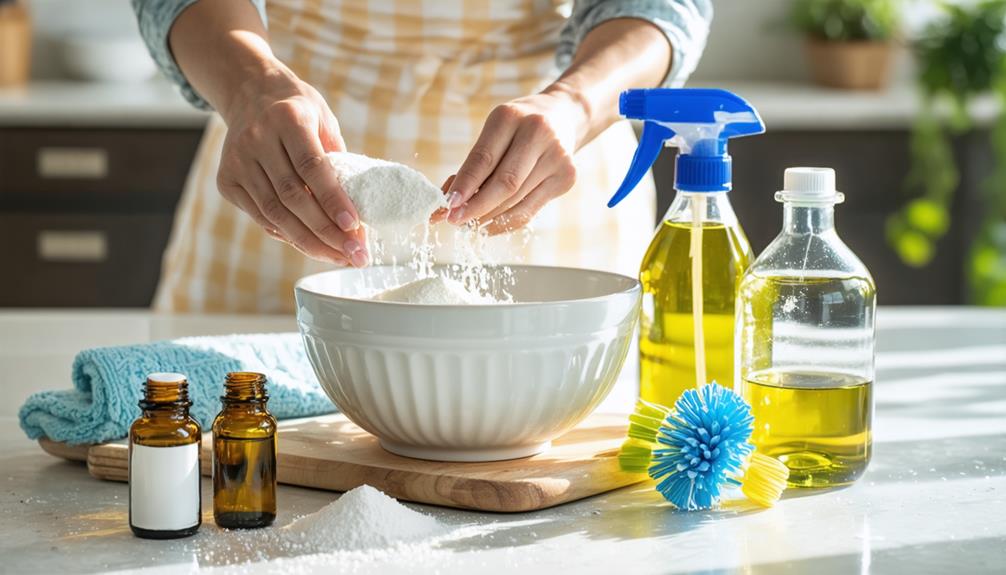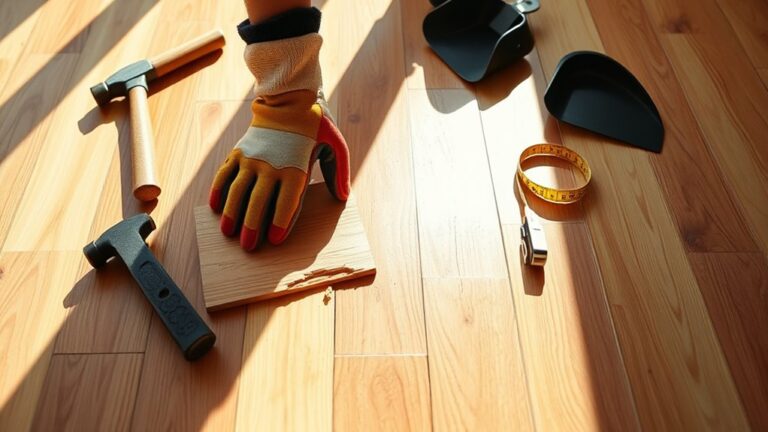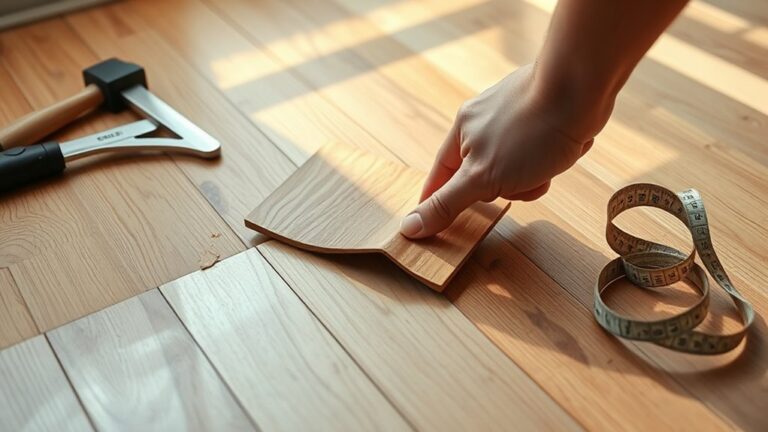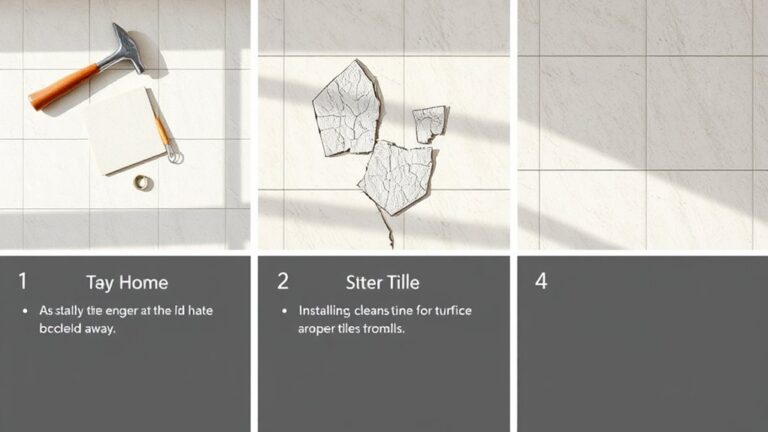You can easily clean your floors on a budget with simple DIY solutions. Try mixing equal parts water and white vinegar for an effective all-purpose cleaner. For hardwoods, combine warm water with a splash of vinegar or olive oil and lemon juice for polishing. Baking soda can tackle tough stains, while rubbing alcohol works wonders on laminate. Always prep your floors by sweeping first, and remember to use a microfiber mop for the best results. With a few ingredients from your kitchen, you'll not only save money but also create a healthier home. There's even more to discover about maintaining your floors!
Benefits of Homemade Cleaners
When it comes to keeping your home spick and span, homemade cleaners offer a range of compelling benefits that can make your cleaning routine not only more effective but also healthier. One of the biggest advantages is their budget-friendly nature; you'll often find that DIY cleaners cost considerably less than commercial products. This means you can save money while still maintaining a clean environment for you and your family.
Another vital benefit is the reduction of harmful chemicals that are often present in store-bought cleaners. By using homemade alternatives, you create a safer space, especially if you have children or pets. Plus, these cleaners can be customized to your preferences, allowing you to incorporate natural fragrances using essential oils, making your home smell delightful without the synthetic scents.
Using homemade cleaners also promotes eco-friendly practices. Many common ingredients like vinegar and baking soda are biodegradable, which means they break down naturally and won't harm the environment. Regularly using these cleaners can enhance the longevity and appearance of your flooring surfaces, reducing the need for frequent replacements and ensuring that your home looks great.
Ultimately, choosing homemade cleaners is a win-win. You get to enjoy a cleaner, healthier home while being kind to your wallet and the planet. So why not take the plunge? Your cleaning routine deserves this upgrade!
Essential Ingredients for Cleaning
When it comes to DIY floor cleaning, knowing the essential ingredients can make all the difference. You'll find that natural cleaners like vinegar, baking soda, and lemon juice not only tackle dirt effectively but also promote a healthier home environment. Let's explore how these key ingredients can transform your cleaning routine and provide impressive results.
Key Cleaning Ingredients
To achieve a spotless home, knowing the key cleaning ingredients can make all the difference. These natural components not only work effectively but also keep your space chemical-free. Here's a breakdown of essential ingredients you can use in your DIY cleaners:
| Ingredient | Benefits | Uses |
|---|---|---|
| Vinegar | Natural disinfectant, deodorizer | All-purpose cleaner, grease cutter |
| Baking Soda | Abrasive cleaner, odor neutralizer | Tough stain remover, carpet cleaner |
| Castile Soap | Gentle, plant-based cleaner | Multi-surface cleaner |
| Essential Oils | Antimicrobial, pleasant scent | Enhances cleaning solutions |
| Lemon Juice | Natural bleach, stain remover | Effective for floors and surfaces |
These ingredients are fantastic for creating effective cleaning solutions. For instance, mixing vinegar and water makes a simple all-purpose cleaner, while baking soda can tackle stubborn grime. Castile soap serves as a gentle cleaner that's safe for various surfaces. Add a few drops of essential oils for an inviting aroma and extra antimicrobial power. Lemon juice can brighten and freshen up your floors. Embrace these key ingredients, and you'll enjoy a cleaner home without breaking the bank!
Benefits of Natural Cleaners
Natural cleaners offer a revitalizing alternative to harsh commercial products, providing numerous benefits for both your home and health. By choosing natural cleaners, like vinegar and baking soda, you're opting for cost-effective solutions that often come from ingredients you already have at home. Vinegar acts as a natural disinfectant, deodorizer, and stain remover, while baking soda serves as an effective abrasive and odor neutralizer.
Homemade cleaners can be enhanced with essential oils, such as tea tree and lemon oil, which not only add a pleasant scent but also provide antimicrobial properties. This means you can keep your living space healthier while maintaining cleanliness. Using plant-based ingredients, like castile soap, guarantees your homemade cleaners are safe for pets and children, reducing the risk of exposure to harmful chemicals.
Regularly using these natural cleaners tailored to your specific flooring types can improve overall cleanliness and extend the life of your floors. Embracing natural alternatives means you're making a conscious choice for a safer, more sustainable home environment without sacrificing effectiveness or breaking the bank.
Recipes for All-Purpose Cleaners
Creating your own all-purpose cleaner can be an easy and cost-effective solution for keeping your home sparkling clean. You don't need expensive products when a simple DIY recipe can do the trick. For a basic homemade cleaning solution, mix equal parts of water and white vinegar in a spray bottle. Add a few drops of dish soap to enhance the grease-cutting power. This natural cleaner is tough on grime but gentle on your surfaces.
If you prefer a scented variation, consider incorporating essential oils like tea tree or lavender into the vinegar-water mix. Not only do these oils smell great, but they also offer antimicrobial properties, boosting your cleaning solution's effectiveness. Vinegar itself is a fantastic natural disinfectant and deodorizer, making it perfect for tackling everyday messes, whether on your floors or countertops.
When using your all-purpose cleaner, remember to spray directly on the surface and wipe it clean with a cloth. It's always wise to test your homemade cleaner on an inconspicuous area first to confirm it won't damage or discolor the surface. With just a few basic ingredients, you can create a versatile solution that meets your cleaning needs without breaking the bank. So, grab your spray bottle and enjoy the freedom of a clean home with your DIY all-purpose cleaner!
Specialized Cleaners for Different Floors
When it comes to cleaning your floors, using the right solution for each type is key to maintaining their beauty and longevity. Hardwood, laminate, tile, and vinyl all have unique needs that require specific cleaning methods to avoid damage. Let's explore effective solutions tailored for each flooring type, ensuring your home stays spotless and well-cared for.
Hardwood Floor Care
Caring for your hardwood floors can be straightforward with the right cleaning solutions. To create a safe and effective homemade cleaner, mix 1 gallon of warm water with 1/4 cup of white vinegar. This solution helps remove dirt without damaging the wood. Regular maintenance is key, so grab a damp microfiber mop and use this cleaner to keep your floors looking their best.
For polishing and achieving a natural shine, you can whip up another blend: combine 1 gallon of warm water with 3/4 cup of olive oil and 1/2 cup of lemon juice. This nourishing mixture enhances the wood's beauty while providing the protection it requires.
However, always remember to test any homemade cleaner in a small, inconspicuous area first. This step guarantees it won't cause discoloration or damage to your hardwood floors. Avoid using vinegar on natural stone surfaces, as it can lead to damage; instead, opt for an appropriate cleaner designed for stone.
Laminate Cleaning Solutions
Although laminate floors are known for their durability, keeping them clean requires some specific solutions to maintain their shine and integrity. A simple yet effective cleaning solution involves mixing 2 cups of warm water with 2 cups of white vinegar. Use a spray bottle to apply this mixture evenly, then mop in small sections to prevent excess moisture that can damage your floors.
Before you start mopping, it's essential to vacuum or use a dust mop to remove fine grit. This step helps to avoid scratches on your laminate surfaces. Avoid using dish soap in your cleaning products, as it can create bubbles that leave a dull residue.
For tough stains, try a mixture of 1 quart of warm water and 1/4 cup of rubbing alcohol. Just be sure to test it in an inconspicuous area first to verify compatibility with your laminate flooring. With these straightforward solutions, you can keep your laminate floors looking fantastic without breaking the bank! Embrace the freedom to maintain your home with simple, DIY cleaning methods.
Tile and Vinyl Methods
Cleaning tile and vinyl floors doesn't have to be a chore; with the right DIY solutions, you can achieve a sparkling finish effortlessly. For your tile floors, mix 2 gallons of hot water with 1/4 cup of white vinegar, 1/4 cup of baking soda, and 1 tablespoon of dish soap. This homemade solution tackles grime and stains while being gentle on your tiles.
For vinyl floors, you'll want a different approach. Combine 2 gallons of warm water with 1/2 cup of rubbing alcohol, 1/2 cup of white vinegar, and just a dash—1/8 teaspoon—of dish soap. This blend maintains the shine without causing damage.
No matter which floor type you're cleaning, using a microfiber mop is key. It traps dirt effectively and prevents streaks, ensuring a thorough clean without excess moisture.
Regular maintenance using these natural floor cleaner recipes not only keeps your floors looking fresh but also extends their lifespan. Say goodbye to harsh chemicals and embrace the freedom of homemade solutions for cleaning floors. With these tips, you'll enjoy a cleaner home and a more sustainable lifestyle!
Effective Cleaning Techniques
An effective cleaning routine starts with the right techniques to guarantee your floors not only look great but also stay protected. Before you mop the floor, always sweep or vacuum to remove dirt and debris. This step guarantees a more effective clean and helps prevent scratches on the surface. When you're ready to mop, opt for a microfiber mop; it's designed for better absorption and reduced streaking, effectively trapping dust and dirt.
To maximize your DIY cleaning efforts, use a DIY cleaner applied in 3-foot sections. This approach allows for even coverage and keeps the solution from drying too quickly. Remember to rinse the mop head frequently to avoid spreading grime around. If the mop becomes saturated, it's time to replace it. Finally, let your floors air dry after mopping—this enhances the cleaning effect and protects surfaces, especially wood and laminate.
Here's a quick reference table for your effective cleaning techniques:
| Technique | Description |
|---|---|
| Sweep/Vacuum | Removes dirt and debris before mopping |
| Microfiber Mop | Better absorption and streak-free finish |
| 3-Foot Sectioning | Guarantees even coverage and prevents quick drying |
Using these techniques will help you achieve a good floor that not only shines but also lasts. You can even add essential oil scents to your cleaning product for a pleasant aroma while you clean. Enjoy your freshly cleaned floors!
Storage and Shelf Life Tips
Once your floors are sparkling clean, it's important to think about how to store your homemade cleaners properly to maintain their effectiveness. The shelf life of these solutions typically ranges from 1 to 3 months, so proper storage is essential. Keep your cleaners in dark, cool places to preserve their potency and reduce degradation over time.
When it comes to storage containers, opt for glass or plastic. These materials keep your solutions safe and effective. Be sure to label clearly; this helps you identify the contents quickly and guarantees you're using the right cleaner for the job.
Before you use your homemade cleaners, don't forget to shake them well. Over time, some ingredients may settle or separate, affecting performance. Regularly check the appearance and smell of stored cleaners. If anything looks off or the scent changes, it's best to discard those solutions.
To make the most of your DIY cleaning experience, mix only enough solution for immediate use. This practice greatly reduces the chance of degradation and keeps your cleaners fresh. By following these storage and shelf life tips, you'll not only save money but also guarantee that your homemade cleaners work effectively every time you need them. With a little care, you can enjoy the freedom of DIY cleaning without the worry of ineffective solutions!
Safety Precautions for DIY Cleaners
When you're mixing up your DIY cleaners, it's important to prioritize safety to prevent accidents and injuries. While creating your own homemade cleaners can be liberating, following some key safety precautions will guarantee you can enjoy that freedom without the worry of mishaps.
Here are four significant safety tips to keep in mind:
- Label Cleaners: Always label your homemade cleaners clearly. This helps prevent accidental misuse, especially if you have children or pets around. Storing them out of reach is just as important.
- Avoid Combining: Be cautious about what you mix. Never combine vinegar with bleach or ammonia, as this can produce toxic fumes that are harmful if inhaled.
- Test Cleaner: Before applying any new cleaner broadly, test it on a small, inconspicuous area. This verifies it won't damage or discolor the surface you're cleaning.
- Use Gloves and Ventilation: When handling strong ingredients, like vinegar or essential oils, wear gloves to protect your skin from irritation. Also, maintain proper ventilation while cleaning. Open windows or turn on fans to minimize inhalation of any fumes released.
Frequently Asked Questions
What Is the Best Homemade Floor Cleaning Solution?
When you're looking for the best homemade floor cleaning solution, consider a simple mix of vinegar and water. A homemade vinegar cleaner, combined with essential oil benefits, can freshen up your space. For tougher stains, a baking soda paste works wonders. You can also whip up a citrus-infused solution or use a castile soap mix for hardwood care. These eco-friendly ingredients guarantee your floors shine while maintaining tile maintenance without harsh chemicals.
How to Clean Floors Cheap?
If you're looking to clean your floors on a budget, consider using eco-friendly cleaners like a vinegar floor solution or a baking soda deodorizer. For cost-effective mopping, DIY cleaning tools like homemade scrubbing pads can really help. Essential oil scents can enhance your cleaning experience, making it pleasant. Remember to follow floor maintenance tips to keep your surfaces in top shape, ensuring your multi-surface cleaners work effectively and last longer.
How Do You Make a No-Rinse Floor Cleaner?
To make a no-rinse floor cleaner, you'll want to mix 2 cups of warm water, 2 cups of vinegar solutions, and 2 cups of rubbing alcohol in a spray bottle. For added cleaning power, try incorporating a few drops of dish soap. If you love essential oil benefits, add 10 drops of your favorite oil. This eco-friendly, pet-friendly DIY cleaning recipe works wonders on various surface types and leaves a streak-free shine!
What Is the Best Thing to Mop Your Floors With?
Imagine your floors as a canvas, waiting for a masterpiece of cleanliness. Using a microfiber mop, you'll glide effortlessly over various floor types, embracing eco-friendly options. Traditional mops can leave streaks, while steam mops offer a deeper clean. Remember to follow frequency guidelines for maintenance and guarantee mop safety by checking for damage. With proper cleaning techniques, you'll transform your space, feeling the freedom and freshness of a home well cared for.




